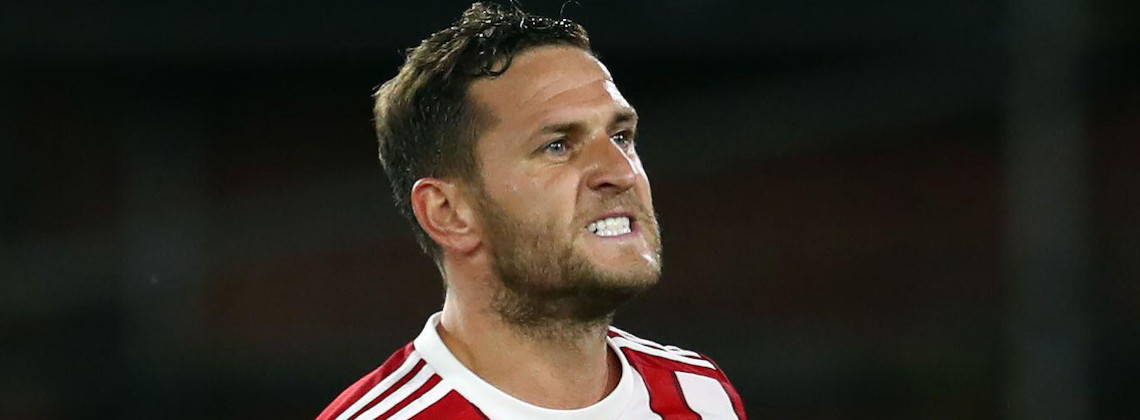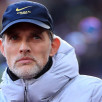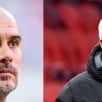
'Fat lad from Sheffield' is up there with the best ever English strikers
Liz Byrnes
18 January 2022
Billy Sharp scores goals, and two more will see him become the all-time Championship top scorer.
The Sheffield United forward stands joint second with Ross McCormack on 120 goals, one behind David Nugent with 121.
Sharp is already the leading scorer in English league football this century. A goal at Wigan on 1 January 2019 propelled him to the 220 mark, one more than former Southampton and England international Rickie Lambert.
Now Sharp – in his own words “that fat lad from Sheffield” - stands on the brink of creating more history.
At 36 next month, he appears destined to end his playing days at Bramall Lane after a career that has seen him score 239 league goals in 575 appearances, at an average of 0.41 goals a game.
His stats compare favourably with former England internationals Alan Shearer and Michael Owen, his heroes growing up.
Shearer scored 284 in 560 games – 0.50 a match – while Owen struck 163 times in 361 league matches for 0.45 goals per game.
That’s why I believe Sharp can be considered one of the best strikers in English football history in terms of his value to the teams in which he plays, the effect he has on those around him, and his longevity.
Starting out on a scoring odyssey
Sharp made his league debut for boyhood club Sheffield United against Watford in November 2004 before going on loan to Rushden and Diamonds.
When he arrived there in January 2005, the club were languishing near the foot of League Two and on his 19th birthday, Sharp scored his first league goal at Chester.
There was an added-time winner against local rivals Northampton, and he finished the season with nine in 16 games as his goals helped Rushden finish third bottom, six points above the relegation zone.
It was also the start of Sharp – like other goalscorers of note – having a major impact on a team and its fortunes.
And as with a young Owen, expectation was no burden but instead there was a natural ability to score goals regardless of age and circumstance.
The club stopped trading in 2011 and were replaced by phoenix club AFC Rushden and Diamonds with chief operating officer and director John Gregory saying:
“Still the most natural goalscorer I have ever seen in a Diamonds shirt. He still has legend status as his goals kept us in the Football League for one more season and of course that winning goal against the Cobblers. If Billy came to a game now the fans would probably sing 'Who put the ball in the Cobblers net? Billy, Billy Sharp!'"
Sharp potent for the Iron
Sharp moved on to Scunthorpe and finished joint top of the League One scoring charts with 23 goals, while his team-mate Andy Keogh flourished alongside him with 15 goals for the most prolific season of his career in England.
That is another thread that runs through Sharp’s career where he has inspired others with an infectious love of scoring goals and a style of play that helped those playing with him.
Sharp and Keogh at Scunthorpe may not have the same to ring to it as Shearer and Chris Sutton at Blackburn, but the partnership was similarly fundamental to the Iron’s fortunes – and especially the following season where, if he hadn’t already attained hero status at Glanford Park, he did then.
Thirty goals propelled the Iron to the 2006/07 League One title and seared on the minds of the fans to this day is his double against Huddersfield on 14 April 2007 that saw them clinch promotion to the second tier for the first time in 44 years.
Decent return for Rovers
Off to Doncaster Rovers on loan where 15 goals in 32 starts saw them finish 12th in the Championship, five points behind Sharp’s parent club Sheffield United, and the move was made permanent.
The same number of goals the following season ensured Rovers beat the drop, finishing fourth bottom as the Blades were relegated.
In 2011/12, Rovers went down, but each year Sharp was top scorer, always managing to score goals whether in a successful or struggling team.
Once more he had struck up fine partnerships, this time with winger James Coppinger and forward James Hayter, with both men’s scoring contributions increasing.
He moved to Southampton in January 2012 for around £1.8million where nine goals in 11 starts helped propel them back to the Premier League.
Back at the Blades for Wilder adventure
Sheffield United were languishing in League One when Sharp returned and had just appointed Nigel Adkins as manager.
Sharp struck 21 times – with partner Che Adams notching 11 - as the Blades finished 11th and Adkins was fired to be replaced by Chris Wilder, heralding a five-year odyssey with Sharp made club captain.
It didn’t start off well though: four matches into the season and the Blades were bottom of League One following a late defeat at Millwall.
Wilder stopped the team bus outside an off licence in Bermondsey, south London, summoned Sharp and gave him money and instructions to buy as much beer as he could carry.
It kick-started the campaign which saw United promoted as champions with 100 points.
Sharp scored 30 league goals in 46 appearances, reaching the 200 landmark during the win at MK Dons in April, and was voted League One Player of the Year.
This time the onus was on Sharp with strike partner Leon Clarke not really firing until the last six games of the season.
Sharp though led by example as his goals fired his team to the second tier.
There is a gulf between League One and the Championship, but this mattered little to Sharp whose game is based on vision, awareness, anticipation and lethal finishing.
In February 2019 he took his Blades tally to 101 with a hat-trick at Aston Villa and finished the season with 23 goals in 40 appearances as they finished second to secure promotion to the Premier League.
Alongside him with 15 goals was David McGoldrick, who had joined in the close season after being released by Ipswich, and another partnership formed in quick time which soon flourished.
The gap between the second and third tiers becomes a gulf in relation to the Premier League, with many pundits questioning how the Blades would survive in the top flight.
It was Sharp though who came on as a sub in the opening game of the season, and pounced to score a late equaliser at Bournemouth.
Sharp was just doing something that comes naturally and at which he has worked throughout his footballing career. No ego, no being overawed or drained by the excitement and prospect of Premier League football. Simply, staying professional, doing what he does best and scoring goals.
His other goals came against Bournemouth in a 2-1 win and the winner against Norwich in the final match before lockdown.
He was not as prolific in the Premier League by any means, but still a valued member of the team, coming on late in the game to disrupt and lead by example.
If that was a campaign that will live long in Blades fans’ minds, so will 2020/21, but for very different reasons.
It wasn’t until the 18th game that they claimed their first win with Sharp scoring the only goal against Newcastle with a penalty. It was his 100th league goal for the club, one of three he scored during a torrid season that was cut short by injury and subsequent surgery.
Now back in the Championship, Sharp has moved to within two of the scoring record with six goals so far this season.
Sharp doing what he does best at his boyhood club is reminiscent of Shearer during ten seasons at Newcastle. Both men have had a huge impact on their teams’ fortunes whether they be doing it alone or alongside a fellow striker.
How does he do it?
Sharp is on such fine form that it suggests he can play for a few years yet.
He has identified his attributes and worked hard to hone them and is always able to evade his marker even if just once in a game.
Sharp is potent in front of goal, and also has seven assists to his name this season. He uses every bit of his experience to run the channels and create time and space for others by pulling his defenders around the pitch.
Throughout his career he has quickly and effectively forged potent partnerships, helping others rise beyond what they believed their potential to be, or has taken on the goalscoring burden.
He may not have been runner-up in the world player of the year like Owen, or been lavished with praise by the likes of Diego Maradona following his goal against Argentina at the 1998 World Cup.
Nor is he the record scorer in the Premier League or a top-flight title winner like Shearer.
But neither does he have the pretensions to being any better than he is – and therein lies some of his power.
He has worked hard and become the best that he can be. His goals have guided his sides to lower-league titles and safety before, finally, a tilt at the Premier League.
He has led by example from a very young age and the influence and impact he has had on his teams – and continues to do so – in my opinion makes him a worthy member of the very best English strikers’ pantheon.
Liz Byrnes
18 January 2022


